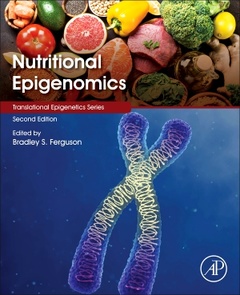Nutritional Epigenomics (2nd Ed.) Translational Epigenetics Series

Nutritional Epigenomics, Second Edition, Volume Fourteen in the Translational Epigenetics series, offers a comprehensive overview of nutritional epigenomics as a mode of study, along with nutrition?s role in the epigenomic regulation of disease, health, and developmental processes. Here, an expert team of international contributors introduces readers to nutritional epigenomic regulators of gene expression, our diet?s role in epigenomic regulation of disease and disease inheritance, caloric restriction and exercise as they relate to recent epigenomic findings, and the influence of nutritional epigenomics over circadian rhythms, aging and longevity, and fetal health and development, among other processes. Disease specific chapters address metabolic disease (obesity and diabetes), cancer, and neurodegeneration, among other disorders. Diet-gut microbiome interactions in the epigenomic regulation of disease are also discussed, as is the role of micronutrients and milk miRNAs in epigenetic regulation. Finally, chapter authors examine ongoing discussions of race and ethnicity in the social-epigenomic regulation of health and disease. This new edition has been fully updated to reflect current research in the field.
SECTION I Introduction 1. Introduction to nutritional epigenomics SECTION II Epigenetic regulators 2. DNA methylation and chromatin modifications 3. Small non-coding RNAs as epigenetic regulators SECTION III Epigenomic regulation of disease 4. The impact of race and ethnicity in the social epigenomic regulation of disease 5. The epigenomic impact of methylation in metabolic dysfunction and cancer 6. The role for DNA/RNA methylation on neurocognitive dysfunctions 7. Histone acylation in the epigenomic regulation of insulin action and metabolic disease 8. Cancer and non-coding RNAs 8. Race in the social-epigenomic regulation of pre- and perinatal development 9. Social and Physical environments in the control of DNA methylation and inflammation during early development 10. Maternal nutrition, epigenetic programming and metabolic syndrome 11. Epigenetic inheritance of metabolic signals 12. The paternal diet regulates the offspring epigenome and health SECTION V Nutritional epigenomics and the circadian clock 13. The interplay between diet, epigenetics and the circadian clock 14. Epigenetic regulation of the fetal circadian clock: implications for nutritional programming of circadian and metabolic function 15. The role for the microbiome in the regulation of the circadian clock and metabolism SECTION VI Caloric restriction and exercise in the epigenomic regulation of aging and disease 16. Epigenomic reprogramming of caloric restriction on aging 17. Dietary restriction in the epigenomic regulation of cardiovascular diseases 18. Epigenomic adaptations of exercise in the control of metabolic disease and cancer SECTION VII Macro- and micronutrients as epigenomic regulators of health and disease 19. B-vitamins and one-carbon metabolism: impacts on the epigenome during development 20. Food bioactives in the epigenomic regulation of metabolic disease 21. Phytochemicals as dietary regulators of the cancer epigenome 22. Regulation of non-coding RNAs by phytochemicals for cancer therapy 23. Short chain fatty acids as epigenetic and metabolic regulators of neurocognitive health and disease
- Empowers researchers and clinicians to employ nutritional epigenomics approaches in their own research and practice
- Offers a full grounding in epigenetic reprogramming and nutritional intervention in the treatment and prevention of disease, as informed by population-based studies
- Concludes with clinical recommendations and practical applications related to nutrition and lifestyle choices
- Fully considers recent advances in the field, including new research into chromatin modifications, non-coding RNAs, and fiber regulation of the microbiome and human health
- Features chapter contributions from international leaders in the field
Date de parution : 03-2025
Ouvrage de 504 p.



